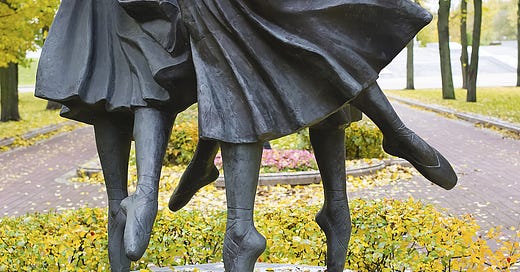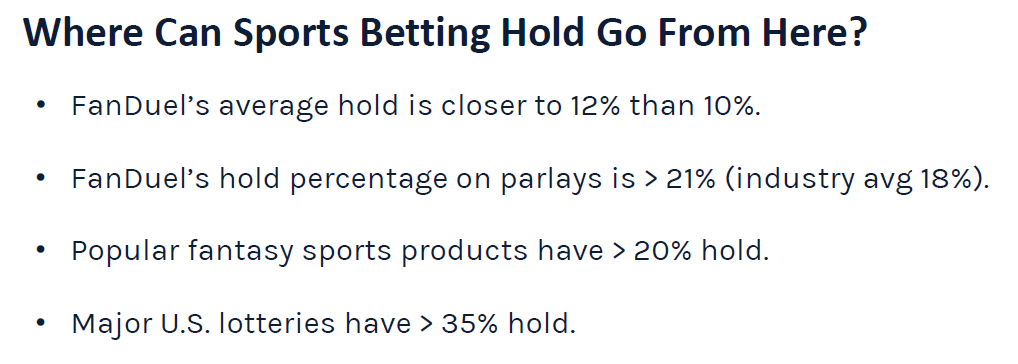Stand On Your Own Two Feet
Sports betting may be online casinos little brother, but little brother has grown up and is capable of charting its own course as a standalone product.
The Bulletin Board
NEWS: Does sports betting need online casinos to thrive? A G2E presentation argues the answer is no longer yes.
LOOSE ENDS: DraftKings-Fanatics saga ending; Rebuck joins IC360; Bovada exits Massachusetts.
NEWS: California tribes will take a unique approach to sports betting.
BEYOND the HEADLINE: The under-the-radar issue in California: RSTF tribes.
WAY BEYOND the HEADLINE: Why a tribal-commercial sportsbook compromise is the best path forward.
WAY, WAY BEYOND the HEADLINE: Will the sweepstakes brouhaha accelerate tribal acceptance of mobile sports betting?
AROUND the WATERCOOLER: The Women in Poker Hall of Fame nominees.
STRAY THOUGHTS: A cautionary tale.
SPONSOR’S MESSAGE - Sporttrade was borne out of the belief that the golden age of sports betting has yet to come. Combining proprietary technology, thoughtful design, and capital markets expertise, our platform endeavors to modernize sports betting for a more equitable, responsible, and accessible future.
“Sporttrade is now live in Arizona on Android and iOS!”
Can Sports Betting Stand On Its Own Two Feet?
Chris Grove, co-founder of Acies Investments, and Tomash Devenishek, co-founder and CEO of Kero Sports (podcast guest #26), presented at G2E, making the case for sports betting as a standalone product capable of ridding itself of the conventional wisdom that it exists to attract casino players.
That made sense when sports betting's hold was roughly 5%. However, with prop bets and SGPs pushing hold numbers into the double digits, there is a growing case that sports betting can stand independently from iCasino.
As the duo noted in their presentation, a 20% hold rate (lottery-level hold) across sports betting products is possible (as seen in the slide below), given the new high-hold, high-volatility products we now see.
Further, it’s becoming increasingly clear that these are the products most customers are drawn to, as the slide below shows the percentage of revenue these products are accounting for:
And that shift to high-hold products is being driven by consumer demand:
Loose Ends: DraftKings-Fanatics Saga Coming to an End; Rebuck Joins IC360; Bovada Exits Massachusetts
Editor’s note: The below entry has been corrected to read hundreds of thousands, not million.
Hermalyn and DraftKings close to a settlement: A tense battle between Fanatics and DraftKings over VIP executive Michael Hermalyn could be coming to an end — the two sides have already spent hundreds of thousands of dollars in legal fees. Per Front Office Sports, “Attorneys for Michael Hermalyn and DraftKings noted in a Tuesday court filing that the two sides “are negotiating a potential resolution” of a federal lawsuit that began days after Hermalyn left for Fanatics Sportsbook in February.”
David Rebuck joins IC360 as a special advisor: IC360 has added former New Jersey Division of Gaming Enforcement executive director David Rebuck as a special advisor. IC360 President Eric Frank called Rebuck “an invaluable resource for the company and our clients.” Frank said, “His deep regulatory expertise and forward-thinking approach will help IC360 continue to navigate the evolving landscape of gaming compliance.” Of interest, Action Network noted that Matthew Holt quietly resigned as CEO this past summer. Holt founded US Integrity, which merged with Odds on Compliance to create IC360.
Bovada restricts access from Massachusetts: Cease-and-desist letters matter, as evidenced by Bovada pulling out of another US jurisdiction (Massachusetts) after the Bay State sent the company a C&D letter several weeks ago. Massachusetts is the 14th state Bovada has exited.
SPONSOR’S MESSAGE - SUBSCRIBE NOW to Zero Latency, the new podcast from Eilers & Krejcik Gaming that provides unparalleled insight into the U.S. online gambling industry through interviews with industry insiders and analysis from EKG experts.
California Tribes Will Use What Works And Discard the Rest
California sports betting has been a hot topic in this newsletter. I’ve spent many words explaining the hurdles and my belief that a compromise between the tribes and commercial operators is the best path forward. However, the big unanswered question is how California gets from Point A to B.
The overarching strategy (but not the details) was relayed by California Nations Indian Gaming Association Chairman James Siva at G2E, as reported by Play USA’s Matthew Kredell:
“We’ve watched what tribes in other states have done, but looking at the unique setup of California, we’re going to come up with something that is going to be a brand new framework for this because that’s the only way it’s going to work in California… I think we’re going to take bits and pieces of other models we’ve seen in other states, lessons learned, different concepts, but what’s going to come out of California is going to be something new and unique.”
That new and unique approach will need to maintain tribal exclusivity and not sow division amongst tribes.
How are these goals met? I have some thoughts.
Tribes must be the predominant forward-facing brand (even if well-known commercial operators provide the underlying platform), and the arrangement must be structured so that tribes cannot be pitted against one another. Recall that the 2022 effort attempted to divide the tribes by dangling a partnership carrot to smaller tribes.
And, of course, there cannot be a backdoor to online casinos.
Beyond the Headline: The RSTF Compromise
On the tribal division front, Siva hinted at one of the least talked about but biggest hurdles, which is getting California’s tribes, big and small, on the same page:
“We know exactly what to do. We have to communicate, have to make sure every single tribe in California benefits from this, protect what we built, and continue to set the future to grow. That’s how we’re going to handle sports betting.”
This means appeasing the ten or so major tribal casino operators, the group of 25 or so Tier 2 tribal casinos, the small but numerous Tier 3 tribal casinos, and the non-gaming tribes that have been pushing for an increase to the Revenue Sharing Trust Fund (RSTF), which has stood at $1.1 million annually since its creation.
Way Beyond the Headline: Compromise Is the Way
There’s no sense in rehashing the same argument, so as I previously wrote:
STTP Thoughts: Mobile sports betting will require a compromise between California tribes and commercial sportsbooks.
Some suggest that tribes can do it alone and partner with B2B companies. However, I’m having trouble envisioning a world where the major online operators sit on the sidelines while tribes and B2B suppliers push through a mobile betting initiative in California. They would have to oppose such a measure, which could very well lead to another failed (and costly) ballot initiative, costing California tribes hundreds of millions of dollars and eating up several more years of precious time.
Yes, tribes hold the keys to the market, but they will need the expertise of commercial operators to get peak performance out of the car. Tribes are not mobile sports betting experts, and in a world where they partner with B2B suppliers, they would be in the driver's seat or have to pay someone to chauffeur them around (too many car analogies?). The suppliers aren’t going to supply that expertise for free, nor will they do the marketing for the tribes, as the major operators would.
So, while it sounds like tribes would get a bigger share of a smaller pie by cutting out the major players, that’s an untested theory. The options seem to be a revenue share agreement with major operators or partnering with suppliers and doing everything on your own — risk management, marketing, and everything else.
Way, Way Beyond the Headline: Is 2026 on the Table?
As Victor Rocha said as far back as March, the plan is to legalize retail sports betting in 2026 and consider mobile betting in 2028.
However, more recent comments put a 2026 mobile betting push on the table. As CDC Gaming Reports reported from G2E, “James Siva, appearing on a panel discussion on tribal sovereignty and sports betting, said the tribes have “learned our lessons” and are already developing a plan to put a measure on the ballot as early as 2026, but more likely 2028. An announcement will be forthcoming after the November election.”
The presence of sweepstakes sportsbooks and casinos could spur tribes into action, perhaps sooner than they originally planned. Yes, they could wage an expensive battle to try to rid California of sweepstakes sites, or alternatively, tribes could fill the current mobile sports betting vacuum themselves.
SPONSOR’S MESSAGE - Highest approvals. Zero chargebacks. No trade-offs.
Aeropay's bank transfers deliver industry-leading net profits without compromising security or conversion rates. 95% of Aeropay transactions are approved, allowing more players and higher customer satisfaction rates.
Aeropay reduced fraudulent transactions during the NFL season by nearly 400%.
With its bank-driven approach to secure and efficient money movement, Aeropay is the smart choice for businesses.
Ready to elevate your payment experience? Book a Demo
Around the Watercooler
Social media conversations, rumors, and gossip.
Cast your votes! (Full disclosure: I used to be on the WiPHoF voting panel.) There are many deserving nominees to choose from.
Stray Thoughts
Catena Media is going through another round of layoffs. This week, 29 people were let go, mainly on the content side, and I’m hearing that another round of layoffs could be coming down the road.
Having worked at or with a few large, publicly traded affiliate companies, this should be a cautionary tale.
There are a lot of really great people (personally and professionally) at Catena et al. Still, there are also a lot of middle managers whose only function, as far as I could tell, was to schedule unnecessary meetings and devise ways to waste workday hours, be it almost always useless training, brainstorming ideas that will never come to fruition, or planning team-building activities. I hear this is an issue in every walk of life at the moment.
Quality control is good, but every additional layer creates more delays and is just another possibility of something going wrong. Trust the people you hire to do their job, put some clear guardrails in place, and get out of their way. Nothing they can do will be worse than what a company overladen with bureaucracy will do to itself.










